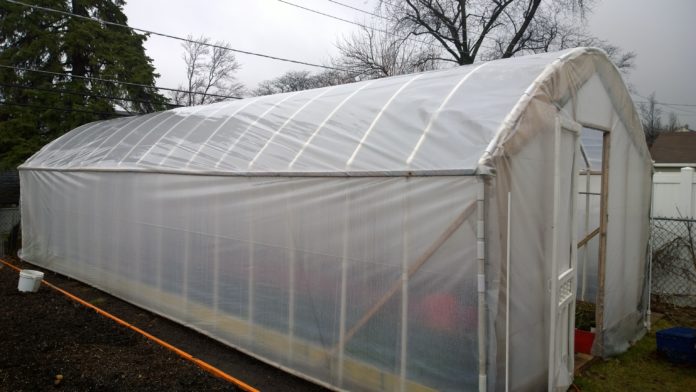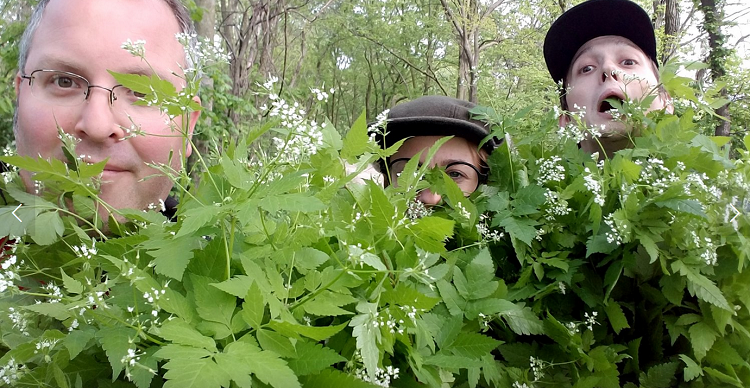Eating Your Neighborhood
Podcast: Play in new window | Download (Duration: 1:42:54 — 47.6MB)
Subscribe: Apple Podcasts | Spotify | Android | iHeartRadio | Podchaser | Email | TuneIn | RSS | More
Urban Nature returns to WTTW
(April 7, 2019) Here’s why you should consider eating your neighborhood. A few months ago, I received a text from a friend of mine. His name is Dan Dinelli and he’s the golf course superintendent at North Shore Country Club in Glenview, Illinois. He’s a ridiculously nice guy and he has been on the show several times. We’ve talked about compost, biochar, turf management and more. This time, though, his text wasn’t about any of those things.
He wanted to get a guy named Dave Odd on my radar. He’s the chief cook and mushroom finder–so to speak–for Odd Produce. Their motto: “If you can eat it, we will find it.” Perhaps I should let Dave describe the business in his own words.
Odd Produce has been providing some of Chicago’s finest restaurants with locally sourced, farmed, and foraged produce since 2009. Mushrooms, microgreens, edible flowers, fruits, berries, vegetables, herbs, spices, and more. You name it, we will find it. Everyday is a non-stop scavenger hunt for us.
Hmm, I thought, I need to contact this guy and have him on the show.
And then, fate stepped in. I received a pitch about a WTTW Chicago show called Urban Nature. It’s a terrific online series of vignettes about how the natural world survives in and interacts with urban areas. Not quite two years ago, Peggy and I interviewed writer and producer Dan Protess when the series was first launched.
In this recent email, this episode description caught my eye.
The Forager
Dave Odd makes a living as a professional food forager, and his Chicago company Odd Produce has supplied foraged goods to more than 300 local restaurants to date. Dave and Marcus take to Chicago alleys in search of delicious eats.
Ding! Ding! Ding! Don’t you love it when serendipity steps in? By the way, Marcus is the host of the show, Marcus Kronforst. He is the Neubauer Family Assistant Professor in the Department of Ecology & Evolution at the University of Chicago.
Today, Dan Protess returns to The Mike Nowak Show with Peggy Malecki. Dan is the Executive Producer, Producer, and Writer of the national prime time 10 that Changed America series. He has been producing and writing at WTTW Chicago for 20 years. His recent productions include season one of Urban Nature and Foodphiles as well as the feature-length architecture and history specials Chicago’s Loop: a New Walking Tour, Biking the Boulevards, and Chicago’s Lakefront. He wrote and produced the Emmy-winning, James Beard-nominated The Foods of Chicago: A Delicious History.
And, of course, he is joined by Dave Odd of Odd Produce. I’m really tempted to take Dave outside and see what we can find to eat on the streets of Evanston, Illinois.
BTW, you should do yourself a favor and check out Urban Nature. The series, now in its second season, explores the wilds of Chicago; Austin, TX; Miami, FL; New York and San Francisco. The episodes are generally around five minutes long and I can guarantee that every single one is fascinating.
The right to grow vegetables
Hoop houses are good things, right? After all, these small structures, often covered in translucent plastic, extend the growing season for professionals and backyard growers alike. So why has such a basic concept turned into a “right to garden” controversy in Illinois?
 This is a story that we’ve kept our eye on since suburban Elhmhurst resident Nicole Virgil was on our show in October of 2017. At that time, she told us the story of how she and her family built a hoop house in their backyard in 2015. The structure was 9 feet tall, 11.5 feet wide and 32 feet long. Its purpose was to allow the Virgils to continue to grow vegetables well into and, quite possibly, through the winter.
This is a story that we’ve kept our eye on since suburban Elhmhurst resident Nicole Virgil was on our show in October of 2017. At that time, she told us the story of how she and her family built a hoop house in their backyard in 2015. The structure was 9 feet tall, 11.5 feet wide and 32 feet long. Its purpose was to allow the Virgils to continue to grow vegetables well into and, quite possibly, through the winter.
However (and how often have we seen this before?), a neighbor complained. The city responded. And, suddenly, the Virgils were told to dismantle their hoop house. They took it down early in 2016 when it was no longer needed to protect their crops, and erected it again towards the end of 2016. Rinse, repeat. This time, the city told them to remove the structure because it violated the mobile home code and the permanent building codes. The City’s position was backed up by a couple of court rulings, and the Virgils removed the hoop house early in 2017.
When Nicole Virgil appeared on our program in October, she and her family were in the process of attempting to change the City laws. According to a report in the Chicago Sun-Times, the issue was considered at three city council meetings, five development planning meetings and three zoning and planning commission meetings.
That process, which Virgil says was riddled with non-responses and the denial to hear the matter in committee, ended in late 2018, when the Elmhurst zoning commission recommended that hoop houses be allowed, but with dimensions no greater than 100 square feet and six feet tall.
“You couldn’t buy a hoop house as small as they’re talking about. You couldn’t even stand up in it, couldn’t move much,” Virgil said, adding that such a small structure wouldn’t allow the proper thermal mass to grow food, anyway.
Regardless, the Elmhurst City Council voted against the recommendation and reaffirmed its ban on hoop houses in February 2019.
It was at that point that the Virgils decided to go to a higher authority–the Illinois General Assembly. They approached State Senator Tom Cullerton (D-Villa Park). He introduced Senate Bill 1675,
which would stop municipalities from banning the construction of a season extension or crop protection device such as a hoop house from October 1 to April 15 every year.
“Hoop houses allow residents to extend growing season to grow fresh produce all year round,” Cullerton said. “It’s a shame that the state needed to get involved to allow local residents to take advantage of countless health benefits throughout our winter months. My hope is the City of Elmhurst reaches a swift and responsible decision in the next week to avoid the state’s involvement.”
The City of Elmhurst might want to seriously consider taking that advice. Groups like the Illinois Environmental Council, Sustain DuPage, Urban Canopy, DuPage County Farm Bureau, DuPage NAACP, Eco-Justice Collaborative, Sierra Club and Elmhurst Hoop House have sided with the Virgils. About 1500 folks also sided with the Virgils when they were asked if there should be a “right to garden” in Illinois.
Yeah, there isn’t much nuance in that phrase. But aren’t bumper sticker phrases the way that we engage with each other in the 21st Century?
Groups like the Illinois Municipal League are against the law because they think these issues should be resolved locally. Heck, I agree! I think preemption laws are the anti-democratic. But where were those voices when so-called preemption laws against local control of pesticides, gun regulations and CAFO sitings were passed?
However, I will make one argument for preemption laws. Is there anybody out there who thinks that municipalities would have gone out of their way to desegregate schools without the Brown v. Board of Education decision?
So there you go. It’s all very complicated. We welcome Nicole Virgil back to the show this morning. She is joined by Laura Calvert, executive director of Advocates for Urban Agriculture. We’ll see where we stand regarding our right to grow vegetables in our own backyards.


